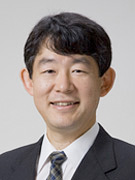Course of
Linguistics and Literature
Professor UEDA Nozomu (Chinese Linguistics and Chinese Literature)
| [Theme] | Start with "The Romance of the Three Kingdoms" and end with "The Romance of the Three Kingdoms"? |
|---|

My two research subjects are as follows: Chinese classics such as "The Romance of the Three Kingdoms" (In Japan, it is normally referred to as "The Chronicle of the Three Kingdoms.") and traditional Chinese performing arts concerning these classics.
I have loved reading "The Romance of the Three Kingdoms" ever since I was a child. Therefore, when it was time to choose a major in college, I had trouble deciding whether to opt for Chinese Language and Literature or Eastern History. Eventually, however, I realized that my true interest lay in the world of literature. From the time I commenced upon the Chinese literature major, I have conducted research on historical novels such as "The Romance of the Three Kingdoms" and the closely related "Sui Tang Yan Yi."
As the majority of the Chinese classics (even those written in a colloquial style) can be traced back to the 12th and 13th centuries, therefore their history is quite long. However, because they were viewed as vulgar compared to poetry or other forms or writing, real research into them only began in the 20th century. Furthermore, as studies into the characters, themes, and thoughts within "The Romance of the Three Kingdoms" have been overemphasized, much of the research on it is biased, and thus there is an unexpectedly large amount of things we still do not know. I have chosen to tackle the questions of just who used what type of resources to create "The Romance of the Three Kingdoms," in what format it was spread throughout East Asia including Japan and China, and how it came across.
Other historical novels apart from "The Romance of the Three Kingdoms" spread throughout China in a similar manner and were even introduced to Japan and translated during the Edo period. Regrettably, they failed to take hold in society for various reasons. In recent years, works such as Yoshiki Tanaka's "Sui Tang Yan Yi" and Kenzo Kitakata's "Yangjia Jiang" have gained some recognition. However, I feel inside that these works fall within a blind spot of the Japanese people's knowledge of Chinese novels.
It is no exaggeration to say that Japan's research of the Chinese classics is second only to that of China. This is because Japanese people have loved to read Chinese novels since olden times. However, although we have continued to treasure these works, there are still plenty of points that we do not understand about them as foreign literature. Therefore, I will continue my research until I retire (if I ever do).
My other great interest apart from the novels is the traditional performing arts of China. Perhaps owing to one of my former teachers during college being a specialist in Chinese theater studies, I have developed interest in what part dramas and narratives played in the creation and circulation of Three Kingdoms stories. Therefore, since my days of studying abroad, I have conducted various mock investigations of mainly rural villages. I have been observing various genres of traditional performance arts in Jiangsu and Zhejiang in these past few years. My fellow researchers of classic novels often give me odd looks and ask why I go to these rural villages. However, I believe that this choice helps me find rare data unobtainable in Japan and grants me sudden insights (very rarely) into things that I could not understand simply by reading. Therefore, I plan to continue my trips alongside my classical studies for as long as I live.

